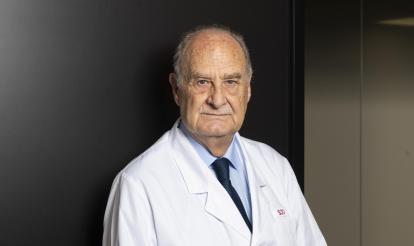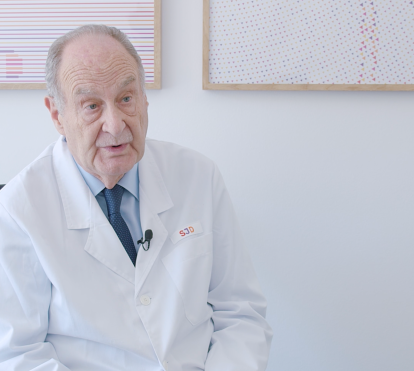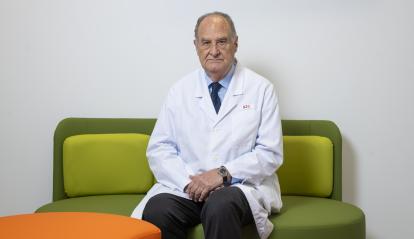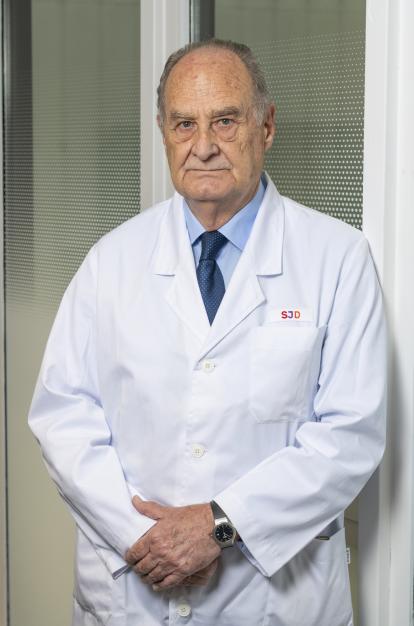
You are reading:

You are reading:

06.09.24
9 minutes readSend your questions to:
Honorary
Professor of Psychiatry at the Universitat Autònoma de
Barcelona and director of the SJD MIND Schools programme at the Hospital
Sant Joan de Déu in Barcelona.
Honorary Professor of Psychiatry at the Universitat Autònoma de Barcelona, director of the SJD MIND Schools programme at the Hospital Sant Joan de Déu and president of the Sant Pau Research Foundation (FISP), Miquel Casas studies the relationship between undiagnosed neurodevelopmental dysfunctions, poor academic performance, multiple behavioural disorders and addictions. His research provides key insights to one of the underlying problems behind the major crisis that our education system is suffering.
What is the current rate of school failure in Spain?
It varies depending on the autonomous community, but both the latest Spanish Confederation of Business Organisations (CEOE) report from 2021 and the Ministry of Education report for 2022 put it between 16% and 18%, a much higher figure than in northern European countries.
How do neurodevelopmental dysfunctions play a role in poor academic performance and thus in the recent drop in academic results evidenced in the latest PISA Report?
Neurodevelopmental dysfunctions – ADHD, dyslexia, dyscalculia, dysgraphia, speech and communication disorders, ASD, etc. – greatly hinder students’ performance. If the majority of students in a school perform well and adapt to the rules but a small minority do not, we cannot simply point directly to family circumstances, socioeconomic level, immigration, the quality or location of the school or the teaching staff as the main causes. We have to find out why these students have learning difficulties, are restless, impulsive or inattentive. In psychology and psychiatry, we refer to all the psychobiological factors that prevent a small group of the population from developing like the others do as individual vulnerability in childhood and adolescence. According to international classifications, most of the time these factors can only be attributed to undiagnosed and untreated neurodevelopmental dysfunctions.

How prevalent are these dysfunctions in children and young people?
They affect at least 20% of the child and adolescent population. In other words, in the developed countries where studies have been carried out, one in five children have neurodevelopmental dysfunctions which are a clear impediment to their academic performance. In Catalonia, there are approximately 850,000 students in primary and secondary education, which means around 170,000 have neurodevelopmental disorders. The resulting situation is challenging, on the one hand for teachers, who are unable to do their job properly, and on the other for these students, who have a really hard time because they can’t keep up with their classmates.
Are most cases diagnosed?
One of the main problems in our country, in contrast to countries with better academic results at school, is that the vast majority are not diagnosed in primary school, which is the ideal time to do so, since these disorders are highly reversible during this period. Currently, only two or three students out of 10 who need it are being diagnosed. This means that in Catalonia there are some 140,000 undiagnosed children who will first experience poor academic performance that will lead to school failure and, later, will most likely develop behavioural issues, socio-occupational problems and addictions.

How important are the words we use when talking to children regarding their behaviour and abilities?
In our working group we’ve coined the term loving abuse to describe the attempt by parents and teachers to help students with learning difficulties and neurodevelopmental dysfunctions, with the laudable aim of stimulating them to improve their academic performance. More often than not, what they achieve is the opposite: they stress these students, causing a progressive aversion to school subjects and the onset of behavioural issues. Almost every day, these children who don’t perform well in class receive unfavourable comments from those closest to them: “Why don’t you try harder?”, “Your brother’s passing”, “You lack willpower”, “Your teacher is always complaining to us”, “If you go on like this, you’ll never amount to anything in life”, and so on. In the early years, they try to please their parents and teachers by putting in a tremendous amount of effort, but they don’t succeed and eventually give up. From the age of 10, they begin to feel emotional distress, and at around 13 or 14, problems with anxiety and depression may emerge, potentially leading to the use of marijuana and alcohol by the age of 15 or 16, along with other behavioural problems. In short, “loving abuse” encompasses the entire period in which the will of these children and adolescents is questioned by those closest to them, aiming to help and encourage them, arguing that they’re not putting enough effort into their studies, without considering that they may suffer from neurodevelopmental dysfunctions that prevent them from achieving satisfactory academic performance.
What are “mental templates” and how can they be applied to the education ecosystem?
If a child doesn’t want to take part in sport, we can look for external reasons, such as coming from a sedentary family, the PE teacher being incompetent or the school not having good facilities. But the first thing we should do is to check if they have flat feet or joint flexibility problems, so we can provide them with insoles that will help them with their sports activities. “Mental templates” is the colloquial term our working group uses to refer to psychobiological instruments or tools (for example, software for learning to read if you have dyslexia) that enable students with neurodevelopmental dysfunctions to reverse these problems or compensate for them and engage in their school activities normally.

What is the role of epigenetics in neurodevelopmental dysfunctions? Can certain situations during pregnancy or the first months of life have an influence?
Every day we have more information on how issues related to environmental toxicity and climate change, or the mother’s toxic habits during pregnancy (smoking, alcohol consumption, etc.) can pose risks to the embryo or foetus. These risks, when interacting with genetic determinants, can lead to neurodevelopmental dysfunctions. In the near future, all this information will enable us to take a much more comprehensive approach to neurodevelopmental disorders, knowing that they are reversible, and to apply the necessary corrective measures to balance the abilities of these children.
What good practices exist in the world on screening, diagnosis and treatment of these neurodevelopmental dysfunctions?
The Nordic countries have integrated it into the study of healthy children, as part of the regular health check-ups by paediatricians during childhood and adolescence. If something abnormal is detected, the child is referred to specialists who carry out a diagnostic and therapeutic approach. And these children are supported throughout their education for as long as they need it.
The Capellades Project, with the support of the ”la Caixa” Foundation, was the pilot project for your research. What does this programme involve?

The project began in 2011, when the Molí de la Vila secondary school, in the town of Capellades, presented a report on Catalan television highlighting the serious problems it was experiencing with very serious behavioural disorders. We quickly discovered that no neurodevelopmental disorders had been diagnosed in either the secondary or the primary school. The child and adolescent psychiatry centre that had to attend to these students attributed everything to the pathological relationship with the families or teachers, socioeconomic levels or immigration. We identified the boys and girls who had learning and neurodevelopmental problems and explained to them, their families and their teachers how these issues could be corrected, and they all agreed to start treatment. Within a year, the problem was solved. And it was no miracle. We have to understand that these children are very resentful of not being able to do as well academically as others, and they rebel against what they see as an injustice. But it’s not a matter of will. The human brain is wired to be curious, to solve problems, to compare with others, to compete and to have fun. If any of these functions fail, don’t blame the child or adolescent. You need to look for the psychobiological cause that best explains it, which in most cases tends to be a neurodevelopmental dysfunction.
Capellades was the seed for the birth of the SJD Mind Schools programme. What projects are you currently developing?
We’re working with the Vedruna schools, Sant Cugat Town Council and Vic Town Council. In state-funded and subsidised private primary schools in these two towns, screenings and diagnoses of neurodevelopmental disorders are being conducted in the second year of primary school, which means that in a few years’ time there will be magnificent results at the school level. This is a policy being implemented by the town councils, but it would be desirable for the Department of Education to implement it. At the same time, an extension of the programme has started to be developed in universities.
Does the problem also affect higher education?
Nowadays, you can progress through school years with poor academic performance and failed subjects and still get into university. But, according to the 2022-23 report of the Ministry of Universities, between 27% and 33% of university students do not finish their degree, with 22% of them not making it past their first year. These are truly terrible figures for students and their families. And, as a country, it represents a significant drain on economic and productive energy. Our working group believes that a large majority of university students who drop out suffer from neurodevelopmental dysfunctions that were not diagnosed or treated at school age. Thanks to the ”la Caixa” Foundation, last year we began a major three-year study (2023-2026) on first-year undergraduate students to verify this working hypothesis which, if confirmed, will completely change the focus of the advice, support and academic-psychological approaches currently offered to these students at risk of academic failure.

What other improvements are needed in our country, in your opinion?
Neurodevelopmental dysfunctions should be studied formally, compulsorily and in depth in all teacher training and pedagogy faculties. Currently, all teaching innovations in primary and secondary education come up against the reality of the 20% of students who will not be able to keep up with the pace. But if we manage to help that 20% with learning difficulties overcome them, the educational level of the entire class and the country as a whole will improve rapidly, bringing us up to the European level in just a few years.